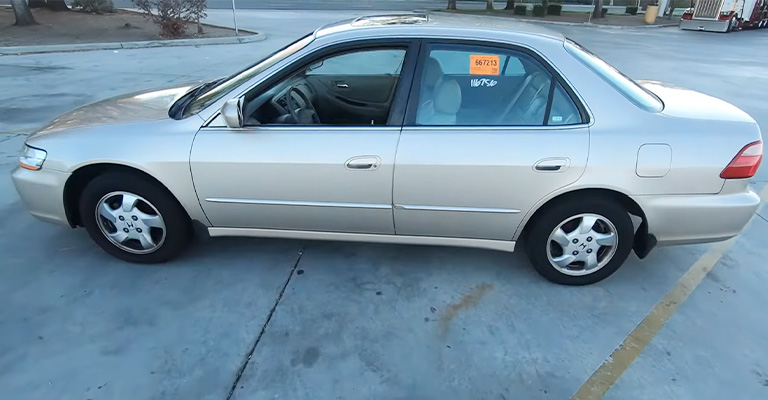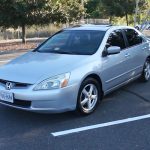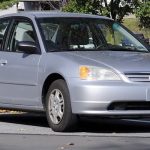The 2001 Honda Accord is a popular mid-size sedan that has been in production since 1976. While it is generally a reliable car, like all vehicles, it can experience problems. Some common problems that have been reported by 2001 Honda Accord owners include transmission issues, engine problems, and electrical issues.
In this article, we will discuss some of the most commonly reported problems with the 2001 Honda Accord and provide information on how to troubleshoot and fix them.
It is important to note that this article is for informational purposes only and is not intended as a comprehensive guide to fixing all possible problems with the 2001 Honda Accord.
If you are experiencing problems with your car, it is always best to consult a qualified mechanic or dealer service center.

2001 Honda Accord Problems
1.”No Start” Due to Ignition Switch Failure
This problem can occur when the ignition switch fails, preventing the car from starting. The ignition switch is responsible for sending an electrical signal to the starter motor, which in turn starts the engine.
If the ignition switch fails, the starter motor will not receive the necessary electrical signal and the engine will not start.
Symptoms of this problem may include the car not starting when the key is turned in the ignition, the key getting stuck in the ignition, or the dashboard warning lights coming on. In some cases, the car may start and then stall shortly thereafter.
To fix this problem, the ignition switch will need to be replaced. This can usually be done by a qualified mechanic or dealer service center.
2. Check Engine and D4 Lights Flashing
The “Check Engine” light is a warning light that appears on the dashboard of many cars, including the 2001 Honda Accord. It is used to indicate that there is a problem with the car’s engine or emission control system.
The D4 light is a transmission-related light that is used to indicate the transmission is in a “drive” position.
If the “Check Engine” and D4 lights are flashing simultaneously, it can indicate a problem with the car’s transmission. This problem can be caused by a variety of issues, such as a faulty transmission control module or a transmission fluid leak.
Symptoms of this problem may include the transmission slipping, the car hesitating when accelerating, or the transmission shifting erratically.
To fix this problem, it is important to diagnose the cause of the issue and then address it accordingly. This may involve replacing a faulty component, repairing a leak, or flushing the transmission fluid.
3. Radio/Climate Control Display May Go Dark
Some 2001 Honda Accord owners have reported that the display for the radio or climate control system may go dark, making it difficult to see or use these features. This problem can be caused by a variety of issues, such as a faulty display unit, a damaged wiring harness, or a problem with the car’s electrical system.
Symptoms of this problem may include the display going dark or becoming difficult to read, the radio or climate control not working properly, or the display flickering or behaving erratically.
To fix this problem, it is important to diagnose the cause of the issue and then address it accordingly. This may involve replacing a faulty component, repairing a damaged wiring harness, or performing electrical repairs.
4. Faulty Door Lock Actuator May Cause Power Door Locks to Activate Intermittently
The door lock actuator is a small electric motor that is responsible for activating the door lock mechanism when the power door locks are activated. If the door lock actuator fails, the power door locks may activate intermittently or not at all.
Symptoms of this problem may include the power door locks activating on their own, the power door locks not functioning properly, or the door lock switch feeling “mushy” or not responding as expected.
To fix this problem, the faulty door lock actuator will need to be replaced. This can usually be done by a qualified mechanic or dealer service center.
5. Warped Front Brake Rotors May Cause Vibration When Braking
The brake rotors are a crucial part of the braking system, as they are responsible for providing a surface for the brake pads to press against, creating friction and slowing the car down. If the front brake rotors become warped, it can cause a vibration when braking.
This problem can be caused by a variety of issues, such as the rotors becoming overheated due to heavy braking, or the rotors becoming worn out over time.
Symptoms of this problem may include a vibration or pulsation in the brake pedal or steering wheel when braking, the car shaking when braking, or a “grabbing” sensation when braking. To fix this problem, the front brake rotors will need to be replaced. This can usually be done by a qualified mechanic or dealer service center.
6. Air Conditioning Blowing Warm Air
If the air conditioning system in a 2001 Honda Accord is blowing warm air, it can be a frustrating and uncomfortable experience. This problem can be caused by a variety of issues, such as a refrigerant leak, a faulty compressor, or a problem with the air conditioning system’s controls.
Symptoms of this problem may include the air conditioning blowing warm or lukewarm air, the air conditioning not turning on at all, or the air conditioning not cooling as well as it should. To fix this problem, it is important to diagnose the cause of the issue and then address it accordingly.
This may involve repairing a leak, replacing a faulty component, or adjusting the air conditioning system’s controls.
7. Front Compliance Bushings May Crack
The compliance bushings are rubber or polyurethane bushings that are used to absorb shock and reduce vibration in the suspension system of a car. If the front compliance bushings on a 2001 Honda Accord crack, it can cause problems with the car’s handling and stability.
This problem can be caused by a variety of issues, such as the bushings becoming worn out over time or being damaged by extreme weather conditions.
Symptoms of this problem may include a knocking or clunking noise when driving over rough terrain, the car feeling “bouncy” or unstable when driving, or the front wheels feeling “loose” or “wobbly.
” To fix this problem, the faulty front compliance bushings will need to be replaced. This can usually be done by a qualified mechanic or dealer service center.
8. Porous Engine Block Casting May Cause Engine Oil Leaks
The engine block is the main structural component of an engine, and it is responsible for housing the cylinders and other internal parts of the engine. If the engine block is poorly cast or has a porous surface, it can allow engine oil to leak out.
This problem can be caused by a variety of issues, such as a manufacturing defect or the engine block being damaged by extreme heat or pressure.
Symptoms of this problem may include a puddle of oil under the car, the oil level in the engine dropping rapidly, or the engine running poorly or “smoking.” To fix this problem, the faulty engine block will need to be replaced. This can usually be done by a qualified mechanic or dealer service center.
9. Driver’s Door Latch Assembly May Break Internally
The door latch assembly is a complex mechanism that is responsible for keeping the door closed when it is locked and allowing it to open when the handle is pulled.
If the driver’s door latch assembly on a 2001 Honda Accord breaks internally, it can cause problems with the door not opening or closing properly.
This problem can be caused by a variety of issues, such as the latch assembly becoming worn out over time or being damaged by impact or corrosion.
Symptoms of this problem may include the door not opening or closing properly, the door “sticking” when trying to open or close it, or the door lock not functioning properly.
To fix this problem, the faulty door latch assembly will need to be replaced. This can usually be done by a qualified mechanic or dealer service center.
10. Bad Engine Mounts May Cause Vibration, Roughness, and Rattle
The engine mounts are responsible for securing the engine to the car’s frame and absorbing vibration and shock. If the engine mounts become worn out or damaged, it can cause problems with the car’s handling and performance.
Symptoms of this problem may include a vibration or roughness when driving, a rattle or knocking noise when driving over rough terrain, or the engine feeling “loose” or unstable. To fix this problem, the faulty engine mounts will need to be replaced. This can usually be done by a qualified mechanic or dealer service center.
11. Clock Light May Burn Out
The clock light is a small light that is used to illuminate the clock on the dashboard of a car. If the clock light burns out, it can make it difficult to read the time at night or in low-light conditions. This problem can be caused by a variety of issues, such as the light bulb reaching the end of its lifespan or the light circuit becoming damaged.
Symptoms of this problem may include the clock light not turning on or being dim, the clock being difficult to read at night or in low-light conditions, or the light circuit behaving erratically. To fix this problem, the faulty clock light will need to be replaced. This can usually be done by a qualified mechanic or dealer service center.
12. Leaking Gaskets May Allow Water into Tail Light Assembly
The gaskets in a car are used to seal various components and prevent leaks. If the gaskets in the tail light assembly of a 2001 Honda Accord become damaged or worn out, it can allow water to enter the assembly and cause problems.
This problem can be caused by a variety of issues, such as the gaskets becoming damaged by extreme weather conditions or the gaskets becoming brittle and cracking over time.
Symptoms of this problem may include water accumulating inside the tail light assembly, the tail lights not functioning properly, or the tail light lens becoming foggy or discolored.
To fix this problem, the faulty gaskets will need to be replaced and the tail light assembly will need to be sealed to prevent further leaks. This can usually be done by a qualified mechanic or dealer service center.
13. Check Engine Light for Running Rough and Difficulty Starting
If the “Check Engine” light comes on and the car is running rough or having difficulty starting, it can indicate a problem with the car’s engine or emission control system. This problem can be caused by a variety of issues, such as a faulty sensor, a clogged fuel filter, or a problem with the ignition system.
Symptoms of this problem may include the car running poorly or “stalling” when driving, the car having difficulty starting, or the dashboard warning lights coming on.
To fix this problem, it is important to diagnose the cause of the issue and then address it accordingly. This may involve replacing a faulty component, cleaning or replacing the fuel filter, or performing ignition system repairs.
14. Plugged Moon Roof Drains May Cause Water Leak
The moon roof drains are responsible for carrying water away from the moon roof and preventing leaks. If the moon roof drains become clogged, it can cause water to leak into the car. This problem can be caused by a variety of issues, such as debris or dirt clogging the drains, or the drains becoming damaged or worn out.
Symptoms of this problem may include water accumulating on the floor of the car, water leaking into the car when the moon roof is open, or the moon roof behaving erratically or not functioning properly.
To fix this problem, the moon roof drains will need to be cleared or replaced. This can usually be done by a qualified mechanic or dealer service center.
15. Water Leak Due to Plugged AC Drain
The AC drain is responsible for carrying excess moisture away from the air conditioning system and preventing leaks. If the AC drain becomes clogged, it can cause water to leak into the car. This problem can be caused by a variety of issues, such as debris or dirt clogging the drain, or the drain becoming damaged or worn out.
Symptoms of this problem may include water accumulating on the floor of the car, water leaking into the car when the AC is running, or the AC behaving erratically or not functioning properly.
To fix this problem, the AC drain will need to be cleared or replaced. This can usually be done by a qualified mechanic or dealer service center.
Possible Solution
| Problem | Possible Solution |
| No start due to ignition switch failure | Replace ignition switch |
| Check Engine and D4 lights flashing | Diagnose and fix transmission issue |
| Radio/climate control display goes dark | Diagnose and fix issue with display unit, wiring harness, or electrical system |
| Power door locks activate intermittently due to faulty door lock actuator | Replace door lock actuator |
| Warped front brake rotors cause vibration when braking | Replace front brake rotors |
| Air conditioning blowing warm air | Diagnose and fix issue with refrigerant leak, compressor, or air conditioning controls |
| Front compliance bushings crack | Replace front compliance bushings |
| Porous engine block casting causes engine oil leaks | Replace engine block |
| Driver’s door latch assembly breaks internally | Replace driver’s door latch assembly |
| Bad engine mounts cause vibration, roughness, and rattle | Replace engine mounts |
| Clock light burns out | Replace clock light |
| Leaking gaskets allow water into tail light assembly | Replace gaskets and seal tail light assembly |
| Check Engine light for running rough and difficulty starting | Diagnose and fix issue with sensor, fuel filter, or ignition system |
| Plugged moon roof drains cause water leak | Clear or replace moon roof drains |
| Water leak due to plugged AC drain | Clear or replace AC drain |
2001 Honda Accord Recalls
| Recall Number | Description | Date Issued | Models Affected |
| 19V499000 | Newly Replaced Driver’s Air Bag Inflator Ruptures During Deployment Spraying Metal Fragments | Jul 1, 2019 | 10 models affected |
| 19V182000 | Driver’s Frontal Air Bag Inflator Ruptures During Deployment Spraying Metal Fragments | Mar 7, 2019 | 14 models affected |
| 15V320000 | Driver’s Front Air Bag Defective | May 28, 2015 | 10 models affected |
| 02V051000 | Honda Recalls Certain Sedans and Coupes Due to Defective Seat Belt Buckles | Feb 14, 2002 | 2 models affected |
| 01V380000 | Honda Recalls Certain Sedans and Coupes Due to Defective Seat Belt Buckles | Jan 2, 2002 | 2 models affected |
| 05V025000 | Honda Recalls 1997-2002 Due to Ignition Switch Interlock Failure | Jan 31, 2005 | 3 models affected |
| 04V256000 | Honda Recalls Certain Passenger Vehicles Due to Failed Dimmer Control | Jun 8, 2004 | 1 model affected |
Recall 19V499000:
This recall affects certain 2001 Honda Accord models that were equipped with a newly replaced driver’s airbag inflator. The recall was issued due to a defect in the inflator that may cause it to rupture during deployment, spraying metal fragments inside the car.
This defect poses a serious risk of injury or death to the driver or other occupants of the car. To fix this problem, Honda will replace the faulty airbag inflator with a new, safer one.
Recall 19V182000:
This recall affects certain 2001 Honda Accord models that were equipped with a faulty driver’s frontal airbag inflator. The recall was issued due to a defect in the inflator that may cause it to rupture during deployment, spraying metal fragments inside the car.
This defect poses a serious risk of injury or death to the driver or other occupants of the car. To fix this problem, Honda will replace the faulty airbag inflator with a new, safer one.
Recall 15V320000:
This recall affects certain 2001 Honda Accord models that were equipped with a defective driver’s front airbag. The recall was issued due to a defect in the airbag that may cause it to rupture during deployment, spraying metal fragments inside the car. This defect poses a serious risk of injury or death
Problems and Complaints Sources
https://repairpal.com/2001-honda-accord/problems
All Honda Accord years we talked –




